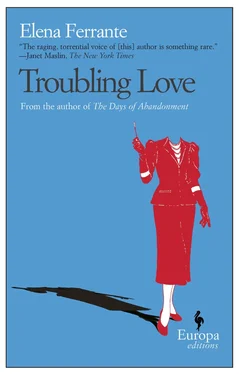They had eaten in cafés, had drunk: certainly a new game had begun, which Amalia had not foreseen but which had seduced her. The first telephone call she had made to me bore witness to a confusion that excited her and at the same time disoriented her. And although they had taken separate rooms in the hotel, the second phone call made me doubt that Amalia had been locked in her room. In that old outfit for important occasions I felt the force that was pushing her out of the house, away from me, and the risk that she would never return. I saw in the blue fabric the dark night of the storeroom next to her bedroom, where I shut myself up to fight with terror the terror of losing her forever. No, Amalia had not stayed in her room.
The next day, they had arrived together in Minturno, probably on the train, maybe by bus. In the evening they had had dinner heedless of the expense, gaily, even ordering two bottles of wine. Then they had walked on the beach at night. I knew that, on the beach, my mother had put on the clothes that she had earlier intended to give me. Maybe it was Caserta who had induced her to undress and put on the clothes, the lingerie, the bathrobe that he had stolen for her from the Vossi sisters’ shop. Maybe Amalia had done it spontaneously, made uninhibited by the wine, obsessed by the neurotic vigilance of her former husband. Violence could be ruled out: violence that the autopsy would have verified had not been verified.
I saw her step out of her old suit, and I had the impression that it stood stiff and desolate, suspended over the cold sand as it was suspended now against the wall. I saw her staggering, drunk, as she tried to put on that luxurious lingerie, garments too youthful. I saw her until, exhausted, she had wrapped herself in the satin dressing gown. She must have seen that something had in a sense slipped away forever: with my father, with Caserta, maybe even with me, when she had decided to change her itinerary. She herself had slipped away: the telephone calls she had made to me, probably in the company of Caserta, were, with their happy desperation, perhaps meant to indicate only the confusion of the situation she found herself in, the disorientation she was experiencing. Certainly when she had gone naked into the water, she had done it by choice. I felt that she imagined herself caught between two sets of pupils, expropriated by two gazes. And I felt her discover, worn out, that my father wasn’t there, that Caserta was pursuing the fantasies of a witless old man — that the spectators of that scene were absent. She had abandoned the satin bathrobe, she had kept on only the Vossi bra. Probably Caserta was there, looking without seeing. But I wasn’t sure. Maybe he had already gone off with Amalia’s clothes. Or maybe she herself had ordered him to go. I doubted that he had taken away dresses and lingerie on his own. But I was certain that Amalia had insisted that he deliver the gifts to me, and that he had promised he would: a final exchange, in order to obtain the old lingerie that was dear to him. They must have talked about me, of what I had done as a little child. Or maybe I had long ago entered into the small-time sadistic game that Caserta was leading. Certainly I was a part of his senile fantasies, and he wanted to take revenge on me as if I were the child of forty years earlier. I imagined Caserta on the sand, stunned by the sound of the tide and by the dampness, as disoriented as Amalia, drunk as she was, and incapable of understanding how far the game had gone. I was afraid he hadn’t even realized that the mouse with which he had amused himself for a good part of his life was fleeing, to go and drown herself.
I got up from the bed mainly so that I would no longer see the blue silhouette hanging on the opposite wall. I could make out the steps that led to the door to the building’s courtyard. There were five, I remembered clearly: I used to play with Antonio, jumping up and down them while his grandfather was making pastries. I counted them as I went up. Arriving at the top, I realized with surprise that the door wasn’t locked but pulled to; the lock was broken. Evidently the old man came and went that way. I opened it and looked out: on one side was the doorway that opened to the courtyard, on the other the flight of stairs going up to what had once upon a time been Caserta’s apartment. Filippo and my father had followed him up those stairs to murder him. At first he had tried to fight back; then he had stopped.
I looked up from the bottom of the stairs, and my neck ached. I had a view decades old that wanted to show me more than I could now see. The story, shattered into a thousand incoherent images, struggled to correspond to stone and iron. But the violence came to an end now, wrapped around the railing of the stairway, and it seemed to me that it had been here — here and not there — for forty years, screaming. Caserta had stopped fighting not for lack of strength or admission of guilt or cowardice but because Uncle Filippo, on the fifth floor, had grabbed Antonio and — yes, that was it — dangled him by the ankles, cursing in a hostile dialect, the language of my mother. My uncle was young, and had both his arms, and threatened to drop the child if Caserta made so much as a hint of a movement. My father’s work was easy.
Leaving the door open I went back into the cellar. With the flashlight I looked for the little door that led to the lower level. I remembered that it was iron, and painted, perhaps brown. I found a wooden door, no more than a foot and a half high: a window more than a door, half closed, with a little hole in the panel and one in the frame: an open padlock was hanging in the latter.
Seeing it I had to admit immediately that the image of Caserta and Amalia going in and out through that door upright and radiant, at times arm in arm, at times holding hands, she in her suit, he in the camelhair coat, was a lie of memory. Even Antonio and I had to bend down to get through. Childhood is a tissue of lies that endure in the past tense: at least, mine was like that. But I heard the cries of the children in the street and it seemed to me that they were not dissimilar from the way I had been: they shouted in the same dialect; each imagined something else. They were invention, while they spent the evening on the dirty sidewalk under the eye of the man in the undershirt. They rushed around on tricycles and yelled insults punctuated by piercing cries of joy. Insults with a sexual basis: at times into their obscene jargon the voice of the man with the iron bar inserted even harsher obscenities.
I let out a faint groan. I heard myself repeating to Antonio words no different from those I was listening to, behind that door, in the black subterranean space; and he repeated them to me. But I was lying when I said them. I was pretending not to be me. I didn’t want to be “I,” unless it was the I of Amalia. I did what I imagined Amalia did in secret. And, lacking journeys of hers that I could be part of, I imposed on her my journeys from home to the Coloniali, the shop of the old man Caserta. She left the house, turned the corner, pushed open the glass door, tasted creams, waited for her playmate. I was I and I was her. I-her met each other with Caserta. In fact I saw not the face of Antonio, when Antonio appeared in the doorway from the courtyard, but what there was in his face of the adult face of his father.
I loved Caserta with the intensity with which I imagined my mother loved him. And I loathed him, because the fantasy of that secret love was so vivid and concrete that I felt I could never be loved in the same way: not by him but by her, Amalia. Caserta had taken what was rightfully mine. As I moved around the painted counter, I moved like her, I talked to myself re-creating her voice, I batted my eyelashes, I laughed the way my father didn’t want her to laugh. Then I went up on the wooden platform and entered the pasticceria with the movements of a woman. Antonio’s grandfather was squeezing out waves of cream from the cloth bag and he looked at me with deep-set eyes, veiled by the heat of the ovens.
Читать дальше












